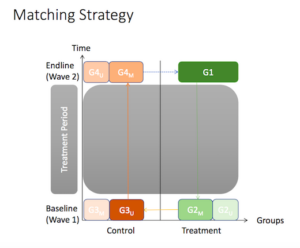In this article, we examine an implicit theory of change that is present in multiple strands of development programming – that a desired, but complicated, outcome can be brought about by programming typologies that aim to spur development in another area. This idea underpins the relationship between employment, jobs programmes, social stability and peace. Despite strong investment in such programmes in the last decade, little is known about how well they perform, or whether they perform at all. In what we call a “pseudo-meta-analysis” across five African countries, we link the location of large employment programmes to stability-related outcomes. While we show some positive impacts, specifically seeing reductions in individuals’ crime of being victimised by crime, these outcomes are far from universal, with trust in government declining in the presence of programmes. More so, we show that employment for peace and stability programmes tend to take place in places with poor employment indicators, not areas with poor stability indicators. This suggests both that the places with the worst employment indicators are not, necessarily, those with the worse stability indicators and that programmes are more concerned with employment than stability. Both findings contrast significantly with the motivations for running employment for stability programmes.
Publication Details
- Year of Publication: 2019
- Region/s: Sub-Saharan Africa
- Theme/s: Human Development · Impact Evaluation · Violence & Peacebuilding
- Research Topic/s: Employment · Peacebuilding & Reconstruction
- Method/s: Quasi-Experimental Designs · Spatial Data Analysis
- DOI: https://doi.org/10.1016/j.econlet.2019.03.033






